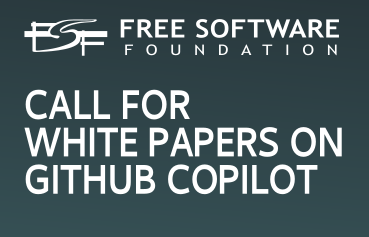Please consider adding [email protected] to your address book, which will
ensure that our messages reach you and not your spam box.
Read and share online:
https://www.fsf.org/blogs/licensing/fsf-funded-call-for-white-papers-on-philosophical-and-legal-questions-around-copilot
Dear Free Software Supporter,

Microsoft's GitHub recently announced a new service known as Copilot.
This service uses machine learning to help suggest code snippets to
developers as they write software. GitHub trained this neural network
with the code hosted on GitHub; while the Free Software Foundation
(FSF) urges free software developers not to host their code on
GitHub, many do, and even many who don't have their work mirrored
there by others.
We already know that Copilot as it stands is unacceptable and unjust,
from our perspective. It requires running software that is not
free/libre (Visual Studio, or parts of Visual Studio Code), and
Copilot is Service as a Software Substitute. These are settled
questions as far as we are concerned.
However, Copilot raises many other questions which require deeper
examination.
The Free Software Foundation has received numerous inquiries about our
position on these questions. We can see that Copilot's use of freely
licensed software has many implications for an incredibly large
portion of the free software community. Developers want to know
whether training a neural network on their software can really be
considered fair use. Others who may be interested in using Copilot
wonder if the code snippets and other elements copied from
GitHub-hosted repositories could result in copyright infringement. And
even if everything might be legally copacetic, activists wonder if
there isn't something fundamentally unfair about a proprietary
software company building a service off their work.
With all these questions, many of them with legal implications that at
first glance may have not been previously tested in a court of law,
there aren't many simple answers. To get the answers the community
needs, and to identify the best opportunities for defending user
freedom in this space, the FSF is announcing a funded call for white
papers to address Copilot, copyright, machine learning, and free
software.
We will read the submitted white papers, and we will publish ones that
we think help elucidate the problem. We will provide a monetary reward
of $500 for the papers we publish.
We will also consider requests for funding to do further research
leading to a later paper.
Areas of interest
While any topic related to Copilot's effect on free software may be in
scope, the following questions are of particular interest:
Is Copilot's training on public repositories infringing copyright?
Is it fair use? How likely is the output of Copilot to generate actionable claims of
violations on GPL-licensed works? How can developers ensure that any code to which they hold the
copyright is protected against violations generated by Copilot? Is there a way for developers using Copilot to comply with free
software licenses like the GPL? If Copilot learns from AGPL-covered code, is Copilot infringing the
AGPL? If Copilot generates code which does give rise to a violation of a
free software licensed work, how can this violation be discovered by
the copyright holder on the underlying work? Is a trained artificial intelligence (AI) / machine learning (ML)
model resulting from machine learning a compiled version of the
training data, or is it something else, like source code that users
can modify by doing further training? Is the Copilot trained AI/ML model copyrighted? If so, who holds
that copyright? Should ethical advocacy organizations like the FSF argue for change
in copyright law relevant to these questions?
Submission guidelines
Submissions must be received by 10am Eastern Daylight Time (14:00 UTC)
on Monday, August 23, 2021 via email to [email protected].
General
The paper should relate to one or more of the areas of interest as
outlined above. We prefer that papers have the community of the free software
movement as their target audience, but papers that are written for
legal professionals will be considered. We suggest that authors obtain feedback from others before
submitting the paper. While we may suggest or request changes after
our review, the paper should be ready to publish when submitted.
Format
The paper should be no longer than 3,000 words. The white paper itself should not include any information that
compromises the anonymity of the author(s), so it can be sent to the
reviewers. In addition to the anonymized white paper copy, attach a separate
document which includes:
Name and email of the primary point of contact for the work; Any removed or anonymized material, which will not be sent to
the reviewers; and The names and affiliations of any co-authors.
All documents should be submitted in an editable free format, such
as OpenDocument or plain text (not DOC or DOCX). We suggest that papers be written in English, but papers in other
languages can be considered. Material included from other people's works should be clearly marked
with appropriate citations.
Review and notification
The FSF's committee will send notifications of acceptance, rejection,
questions, or possible revision requests, via email to the primary
point of contact by Monday, September 20th, 2021.
Publication
If your submission is selected for publication, we will contact you
about choosing a license for the publication. We would expect to agree
on one or more from the following list:
We strongly prefer to publish the authors' names, but on the authors'
request we may agree to withhold their names.
Questions and comments
For any questions about white paper submissions, or the review and
acceptance process, please contact [email protected].
Sincerely,
Donald Robertson, III
Licensing & Compliance Manager
Image Copyright © 2021 Free Software Foundation, Inc., licensed under
Creative Commons Attribution 4.0 International license.
|